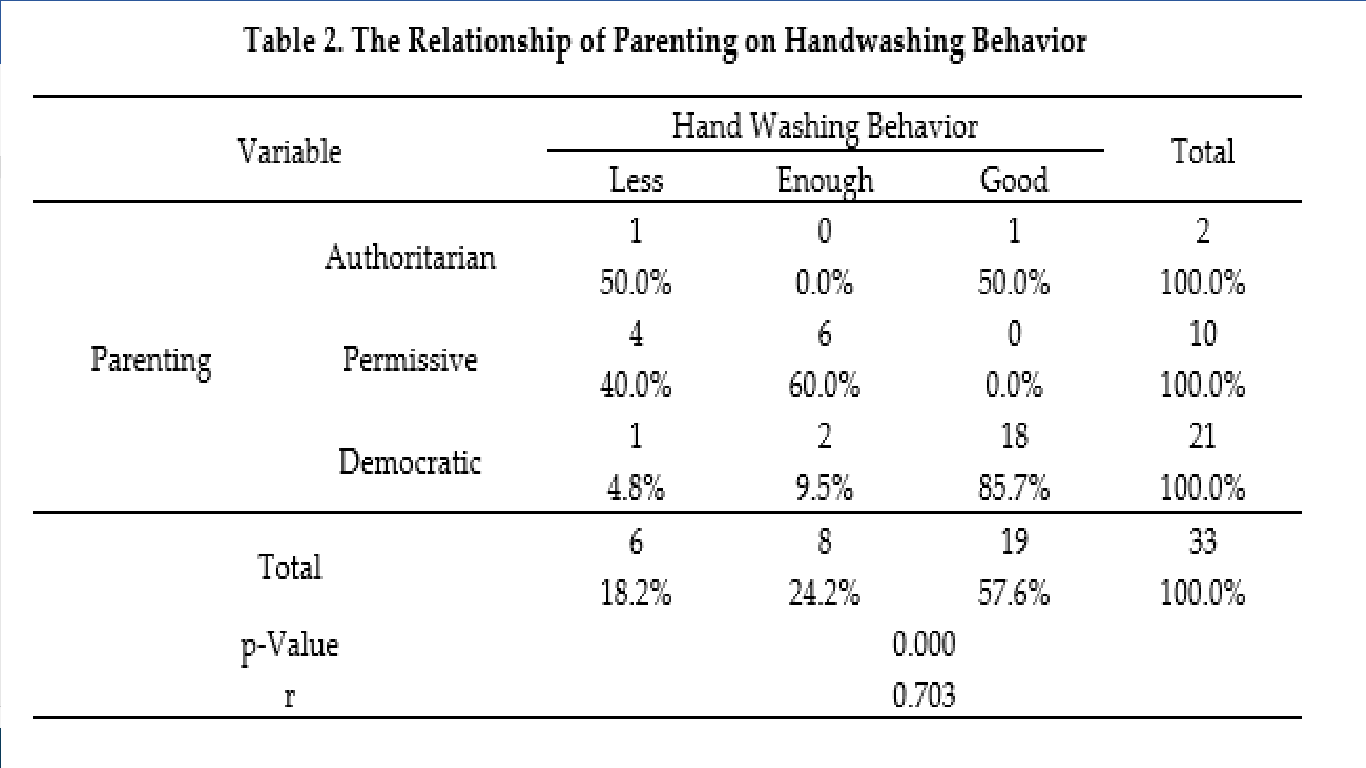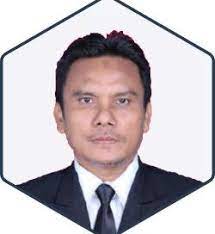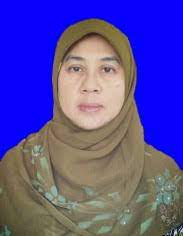The Parenting Styles on Handwashing Behavior for Preventing Coronavirus Disease 19 Spread on Children with Mental Retardation
DOI:
https://doi.org/10.23917/bik.v16i2.1517Keywords:
covid-19, handwashin behavior, parenting, mental retardationAbstract
The increasing number of Coronavirus Disease 19 (Covid 19) in Indonesia has made the government implement health protocols, one of which is washing hands. Children with mental retardation who have intellectual abilities below the average and have difficulty implementing it. The parenting style applied to children will affect the child's behavior, one of which is handwashing behavior. This study aimed to determine the relationship of parenting on handwashing behavior for spread preventing Coronavirus Disease 19 in children with mental retardation. This study utilized a quantitative correlation with a cross-sectional approach. A total of 33 parents who have children with mild mental retardation in Special School 2 Banjarmasin. The research instrument is the parenting style questionnaire and the handwashing behavior observation sheet. The results showed from 33 parents who applied democratic parenting were 21 people (63%), as many as 19 children (57%) with good handwashing behavior. Chi-Square test obtained p-value = 0.000 < ?= 0.05. There is the relationship between parenting on handwashing behavior for Preventing Coronavirus Disease 19 Spread on Children with Mental Retardation. The right parenting pattern for children with mental retardation can help children grow and develop properly.
Downloads
References
Ahmad, A. (2018). Pengaruh Pendidikan Kesehatan dengan Metode Bermain Puzzle Terhadap Kemampuan Mencuci Tangan Anak Tunagrahita di SLB Negeri I Gowa. In Fakultas Kedokteran dan Ilmu Kesehatan Universitas Islam Negeri Alauddin Makassar. https://doi.org/10.1016/j.gecco.2019.e00539%0Ahttps://doi.org/10.1016/j.foreco.2018.06.029%0Ahttp://www.cpsg.org/sites/cbsg.org/files/documents/Sunda Pangolin National Conservation Strategy and Action Plan %28LoRes%29.pdf%0Ahttps://doi.org/10.1016/j.forec
Anggeriyane, E. (2019). Hubungan Usia, Paritas Ibu dan Usia Ayah dengan Kejadian Anak Sindrom Down SLB Negeri Pelambuan Banjarmasin Tahun 2019. Jurnal Keperawatan Suaka Insan, Vol.4 Ed.2. https://doi.org/https://doi.org/10.51143/jksi.v4i2.241
Anggraini, D. D., & Sari, M. H. N. (2020). Pola Asuh Orangtua Terhadap Tingkat Kemandirian Personal Hygiene Cuci Tangan Dan Gosok Gigi Pada Anak Prasekolah. Jurnal Ilmiah PANNMED (Pharmacist, Analyst, Nurse, Nutrition, Midwivery, Environment, Dentist), 15(2), 200–205. https://doi.org/10.36911/pannmed.v15i2.703
Anhusadar, L. O., & Islamiyah, I. (2020). Penerapan Perilaku Hidup Bersih dan Sehat Anak Usia Dini di Tengah Pandemi Covid 19. Jurnal Obsesi?: Jurnal Pendidikan Anak Usia Dini, 5(1), 463. https://doi.org/10.31004/obsesi.v5i1.555
Astuti, & Dwi, N. (2019). Pengaruh Penyuluhan Cuci Tangan Terhadap Pengetahuan Anak Tunagrahita di SDLB Negeri Tuban. JPkM Wahana Husada, 1(2), 15–22. ejurnalstikeskesdamudayana.ac.id
Atmaja, J. R. (2019). Pendidikan Dan Bimbingan Anak Berkebutuhan Khusus. PT Remaja Rosdakarya.
Estella, S. M. (2016). Hubungan Pola Asuh Orang Tua Dengan Tingkat Personal Hygiene Siswa Sekolah Dasar Negeri 06 Pemodis Kecamatan Beduai Kabupaten Sanggau. Nature Structural Biology, 9(6), 458–463.
Jayanti, D. M. A. D., Lestari, R. T. R., & Riskayanti, N. P. (2020). Relationship Between Parents’ Parenting And Independence Level Of Activity Daily Living (ADL) In Soft Mental Retardation Children. Jurnal Ners Dan Kebidanan Indonesia, 8(2), 87. https://doi.org/10.21927/jnki.2020.8(2).87-94
Katmini, & Syakur, A. (2020). Pola Asuh Orang Tua dan Hubungannya Terhadap Kemampuan ADL pada Anak Retardasi Mental di SLB Yayasan Putra Asih. Program Studi Ilmu Kesehatan Masyarakat, Institut Ilmu Kesehatan Strada, 5, 163–164. http://jurnal.unublitar.ac.id/index.php/briliant/article/view/444/pdf
Kementrian Kesehatan RI. (2020). Panduan Cuci Tangan Pakai Sabun. Kesehatan Lingkungan, 1–34. https://kesmas.kemkes.go.id/assets/upload/dir_519d41d8cd98f00/files/Panduan_CTPS2020_1636.pdf
Khushartanti. (2012). Faktor yang mempengaruhi perilaku cuci tangan pakai sabun pada anak sekolah dasa . Jurnal Ilmu Keperawatan, 2, 1–83.
Pratiwi, M. D., & Mualimah, M. (2018). Hubungan Antara Pola Asuh Orang Tua Dengan Tingkat Kemandirian Personal Hygiene Dalam Mencuci Tangan Dan Gosok Gigi Pada Anak Pra Sekolah. Darul Azhar, 6(1), 39–47.
Pujiana, D., & Anggraini, S. (2019). Hubungan Pola Asuh Orang Tua dengan Pemenuhan Kebutuhan Dasar Personal Hygiene Anak Usia 6-7 Tahun. Jurnal ’Aisyiyah Medika, 3(2), 138–149. https://jurnal.stikes-aisyiyah-palembang.ac.id/index.php/JAM/article/view/169/149
Purbasari, D. (2020). Dukungan Pola Asuh Keluarga dan Kemampuan Pemenuhan Personal Hygiene Anak Retardasi Mental Berdasarkan Karakteristik di Cirebon. Syntax Idea, 2(2), 19–31.
Qalbi, H., & Zubaidah. (2017). Gambaran Pola Asuh Ibu Pada Anak Usia Sekolah Dasar dengan Retardasi Mental di Sekolah Dasar Luar Biasa Negeri Semarang. Jurnal Jurusan Keperawatan, 1–8. http://eprints.undip.ac.id/52699/2/ARTIKEL.pdf
Satuan Tugas Penanganan COVID-19. (2021). Peta Sebaran COVID-19. Kementerian Kesehatan RI. https://covid19.go.id/peta-sebaran-covid19
Simanjuntak, J., Virganta, A. L., & Gi, D. N. F. (2019). Relationship of Parenting Parents and Early Childhood Discipline in ASSISI Kindergarten Medan. Proceedings International Conference of Science Education on Industrial Revolution 4.0 (ICONSEIR 4.0), 249–254. https://prosiding.unimed.ac.id/index.php/iconseir/article/view/44/34
Wijanarko, J. & Setiawati, E. (2016). Ayah Ibu Baik Parenting Digital. Keluarga Indonesia Bahagia. https://books.google.co.id/books?id=RGPADQAAQBAJ&printsec=frontcover&dq=Wijanarko,+J.+Dan+Setiawati,+E.+2016.+AYAH+BAIK+IBU+BAIK+Parenting+Digital.+Keluarga+Indonesia+Bahagia.+Jakarta&hl=id&sa=X&ved=2ahUKEwimxueyj7HuAhUXWX0KHRPdCf8Q6AEwAXoECAQQAg#v=onepag
Zumantara, A. (2015). Hubungan Pola Asuh Orang Tua Terhadap kemampuan Anak Tunagrahita Ringan Mencuci Tangan di Sekolah Dasar Luar Biasa (SDLB) Bagian C Dharma Asih Pontianak. Proners, 3(1). http://eprints.undip.ac.id/52699/2/ARTIKEL.pdf

Downloads
Submitted
Accepted
Published
How to Cite
Issue
Section
License
Copyright (c) 2023 Esme Anggeriyane, Ruslinawati Ruslinawati, Regina Wafa Azkiya

This work is licensed under a Creative Commons Attribution 4.0 International License.


















